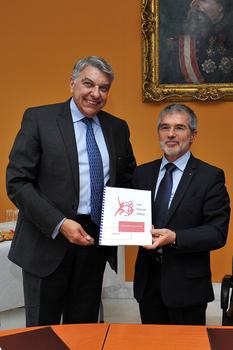Publication of the 1st Annual Report by the Monegasque Anti-Doping Committee
Philippe Orengo, President of the Monegasque Anti-Doping Committee, has just submitted the first annual report by the Monegasque Anti-Doping Committee to Patrice Cellario, Minister of Interior, who was representing the Minister of State, in the presence of members of the Monegasque Anti-Doping Committee, doctors involved in testing, the Department of Education, Youth and Sport and the Ministry of Health and Social Affairs.
This report contains 85 pages and is divided into four parts, each covering the following points respectively:
- The legal framework and the role and responsibilities of the Committee;
- A presentation of the Committee's activities (prevention, monitoring, etc.);
- Budgetary means;
- Objectives set for 2016.
It highlights three priority areas:
- Prevention and information, which requires the collaboration of all those involved (the DENJS, the Sports Medicine Centre, the Monegasque Olympic Committee, Sports Federations and Associations, etc.);
- Continued anti-doping tests. In 2015, 112 procedures were carried out. They show a marked improvement with regard to the requirement to specify athletes' whereabouts (in training and at home) and a complete absence of abnormal results, and therefore no disciplinary procedures;
- Monitoring of the international conventions to which the Principality adheres.
The Minister of Interior welcomed these results, as combating doping is still one of the Principality's priorities. Moreover, the Principality was one of the first countries in the world to adopt an anti-doping framework.
The Monegasque Anti-Doping Committee was founded in 2003 by Sovereign Ordinance. Since 1 January 2015, it has been a private law body, with a Panel of six members, presided over by a member of the Council of State. The Monegasque Anti-Doping Committee is the national anti-doping organisation. The equivalent in France is the French Anti-doping Agency.
Its mission is based on two main areas: preventing doping in all its forms, in particular through education and health, and monitoring doping, with all its consequences, including disciplinary action.
Finally, note that the Monegasque Anti-Doping Committee works in cooperation with all the national anti-doping agencies abroad, the International Olympic and Paralympic Committees, the World Anti-Doping Agency, international sports federations and organisations responsible for organising the major international sports events.











